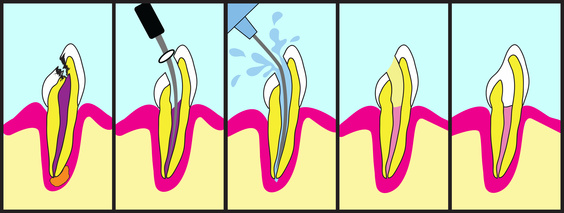(206) 498-2212
(206) 498-2212

Root canal is a treatment to repair and save a badly damaged or infected tooth instead of removing it. The term "root canal" comes from cleaning of the canals inside a tooth's root. When a tooth becomes infected it is usually related to the nerves in the root of the tooth. The infected nerves need to be removed. If left untreated an infection can turn into an abscess, which is a much more serious problem that includes bone loss in the jaw.
To start the root canal procedure, you have dental X-rays to check the extent of damage. You also receive a local anesthetic to control pain, which may be more severe if the tooth is abscessed. The dentist will then drill down into the tooth to create an opening into the canal. They will then be able to remove infected tissue and clean the canal. After the infection has been removed, the space if filled with a sealant. The final stage of the root canal is restoring your tooth. Because the tooth typically has a large filling or is weakened from extensive decay, it needs to be protected from future damage and returned to normal function. This is usually done by placing a crown.
After your root canal, your restored tooth with the new crown should work normally and look cosmetically pleasing. If you follow good dental and oral hygiene, your restored tooth could last a lifetime. The first few days after your root canal, the tooth may be sensitive. Over-the-counter pain medications can help. If pain or pressure lasts more than a few days, be sure to talk to your dentist or endodontist.